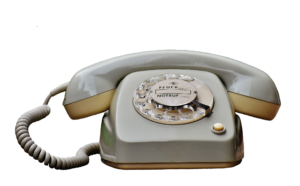
Did you use(d) to have a phone like this?
In a sentence like the one in the title, which is correct,”use” or “used”?
The answer is that both are correct, but not everybody agrees about this. Going into more detail, let me start by quoting some authorities. I have selected a few prestigious voices, not individual opinions.
Cambridge dictionaries accept both forms but recommend just one (“in exams”).
The negative of used to is most commonly didn’t use(d) to. Sometimes we write it with a final -d, sometimes not. Both forms are common, but many people consider the form with the final -d to be incorrect, and you should not use it in exams: It didn’t use to be so crowded in the shops as it is nowadays.
Used to – English Grammar Today – Cambridge Dictionary
Macmillan dictionaries consider that questions and negatives should be formed with “did(n’t) use to”.
Used to is usually followed by an infinitive:
We used to swim in the river.
But sometimes the following infinitive is left out:
I don’t play golf now, but I used to.
Used to only exists as a past tense.
Questions and negatives are usually formed with ‘did’ + use to (with no ‘d’):
Did you use to work here?
We didn’t use to earn much.
The spelling ‘did used to’ is sometimes used, but many people think that this is wrong.
In formal English, negatives are often formed with used not to:
They used not to allow shops to be open on Sundays.
The short forms usen’t to and usedn’t to are sometimes used, but they sound rather formal and old-fashioned.
used to (modal verb) definition and synonyms | Macmillan Dictionary
Oxford University Press English Language Teaching consider that questions and negatives should be formed with “did(n’t) use to”.
Complete the sentences with the affirmative, negative or interrogative form of used to and the words in brackets. Use contractions where possible.
used to – didn’t use to – didn’t use to – Did they use to – used to – did you use to – didn’t use to – used to
Cobuild consider that the negative of “used to” can be formed in three ways but the interrogative should be formed with “did” and “used to”.
The phrasal modal used to has three negative forms: used not to, didn’t used to, and didn’t use to.
The interrogative of verb groups formed with most phrasal modals is made by placing the Subject after the first word in the phrase, as in Have you got to go? or Would you sooner stay? The interrogative form of have to is do you have to, as in Do you have to go? The interrogative form of used to is did you used to, as in Did you used to eat sweets?.
THE COBUILD SERIES © HarperCollins Publishers Ltd
Wiktionary accepts all forms but declares that “use to” in negatives and interrogatives is more common in American English.
- With did as an auxiliary verb (as in the negative and interrogative), use to is considered standard, especially in American English. In other cases, such as I use to go to the fair every year, it is considered an error, motivated by the near (or exact) homophony of use to and used to.
- The negative may be formed as used to not or used not to (usedn’t to, usen’t to), did not used to (didn’t used to).
- The interrogative is constructed like did [subject] used to…? or used [subject] to…?, varying by region and era.
- When it is not necessary to include the following verb, in some regions it is usual to use the verb do as a stand-in (he works harder than he used to do), whereas in others it is usual to use no verb at all (he works harder than he used to).
What is going on? Why is there such diversity of opinion?
The problem is that “used to” is an anomalous verb (in the words of British linguist Geoffrey Leech). It is not a normal verb: it has no present form (*She uses to…); it has no perfect aspect (*I have used to live there.); it has no infinitive. Neither is it a standard modal verb: it does not occur with perfect aspect (*I used to have been working all morning.); it has interrogative, negative and emphatic forms with “did”. And so on.
Since it is an anomalous verb, anything goes! But, with its “-ed” spelling, “used to” looks like the past form of a regular verb (and indeed this is its etymology), so it is perhaps not surprising that many people prefer to parse it like a regular verb in interrogatives and negatives. (This is entirely a question of spelling, since the pronunciation is invariable: /juːs(t).tu/ or /juːs(t).tə/.)
Returning to the original question – Which form is correct? – both are, despite what some may say.
We note that this is not the only time that a word in English looks like one kind of beast but behaves like another. For example, “news” is not plural; “made” is past but “fade” is not; “belated” is not a verb; “darling” is not a present participle. These are different cases, granted, but the point I am trying to make is that language is often more irregular than we care to admit.
And to finish with, I note that there is no ultimate authority and no definitive answer to this kind of question. English is a liquid language for our liquid times!








